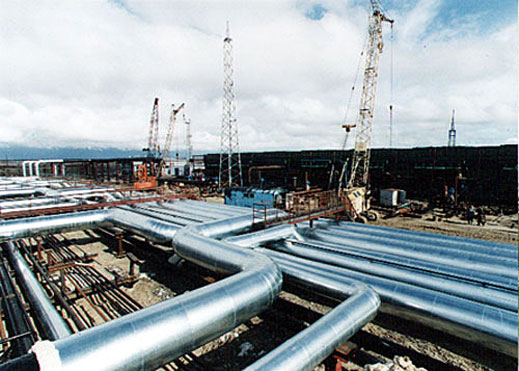
Hungary Doubling Efforts for Nabucco Ahead of Budapest Summit
Publication: Eurasia Daily Monitor Volume: 5 Issue: 237
By:

The Hungarian government and the private MOL energy company are doubling their efforts to help launch the Nabucco gas project on schedule. Given Hungary’s 80 percent dependence on Russian gas, even the oft-wavering Socialist Party has joined the consensus view that supply diversification through Nabucco is imperative for the country’s energy security and its strategic security in a broader sense. Moreover, Hungary will be hosting a Nabucco Summit in January 2009 and is aiming for a breakthrough there.
Although the Socialist government joined Gazprom’s South Stream project, Nabucco’s rival, in January, MOL did not. Shortly afterward it became clear that in the foreseeable future Russia would not produce enough gas to supply the South Stream pipeline (or gas storage sites within Hungary) with the declared volumes. The government’s choice of South Stream in January contravened the goal of energy security through supply diversification. Aiming for a quantitative increase in Russian gas deliveries to cover future demand, it underestimated Nabucco’s prospects. As Prime Minister Ferenc Gyurcsany and others soon realized, their derogatory references to Nabucco as a “distant dream” turned out to be an appropriate description of South Stream. Sharply criticized by the opposition Fidesz party, the government adjusted its policy accordingly.
On December 11 the government’s special envoy for the Nabucco pipeline project, Mihaly Bayer, and top MOL management testified to the Hungarian Parliament’s ad-hoc committee on Nabucco. According to the Hungarian media, they reported that negotiations had begun toward signing the intergovernmental agreement among countries on the pipeline’s planned route (Turkey, Bulgaria, Romania, Hungary, and Austria). Hungary’s Ministries of Foreign Affairs, Land Affairs, Justice, and Finance and other government agencies are involved in the drafting.
Turkey continues to pose difficulties. It demands, among other things, a 15 percent lift-off from the gas in transit through its territory as well as a price discount on gas delivered to Turkey from Azerbaijan. The Turkish government hopes to sign the intergovernmental agreement in Ankara in January 2009, just in time for the Nabucco Summit in Budapest to show this result. Negotiating under the pressure of a summit deadline, however, would seem to increase Turkey’s leverage.
MOL president Zsolt Hernadi testified that funding by the European Union was necessary for kick-starting the Nabucco project. MOL’s CEO Gyorgy Mosonyi similarly observed that investors would be reluctant to take risks with the project unless it were covered by EU funding. The parliamentary committee asked the government to muster as much support as possible in Brussels for a proposal to create a Nabucco sponsoring group. This view is consonant with a growing understanding in both Brussels and Washington that financial backing by the European Commission and the U.S. government is necessary for large-scale infrastructure projects in the Caspian basin (see EDM, November 16).
The MOL executives in the parliamentary hearing identified the company’s top goals as implementing the Nabucco project and NETS (New Europe Transmission Systems). Initiated by MOL one year ago, NETS is a project to interconnect the gas transmission systems of EU members and aspirant countries in Central and Southeastern Europe (MTI-Eco, Napi Gazdasag, December 11).
In July Hungary proposed hosting a Nabucco summit in Budapest for state and industry leaders from the Nabucco consortium countries, possible supplier countries, transit countries, and relevant international institutions, with the participation of the EU and the United States as political supporters of this project. Gyurcsany first aired the summit initiative during his visit in July to Azerbaijan and Turkmenistan, which are prospective suppliers of gas for the Nabucco project. MOL executives took part in that visit. The government appointed one of its most senior diplomats, Mihaly Bayer, as full-time special envoy for promoting the Nabucco project with countries along the producer-transit-consumer chain and international organizations. Bayer is filling a role that seems to have been all but abandoned by the EU’s Nabucco project coordinator, although the EU deems Nabucco a top priority. MOL executives have spoken up forthrightly about the need for Iranian gas to guarantee full supplies for the pipeline’s second phase (see EDM, July 21, September 30).
In late November and early December, Hungary sounded out Kazakhstan for possible gas inputs into the Nabucco pipeline. The Hungary-Kazakhstan intergovernmental economic commission held its inaugural meeting in Astana on November 28. The Hungarian side expressed interest in gas supplies for Nabucco and direct cooperation between KazMunayGaz and MOL (Kazakhstan Today, November 28). The Hungarians reaffirmed their interest during the visit of Kazakhstan’s parliamentary chairman, Ural Muhammedjanov, to Budapest on December 3 and 4. The Kazakh side replied positively, conditional on the opening of a trans-Caspian pipeline to Azerbaijan (to link up with Nabucco through the existing Baku-Tbilisi-Erzurum pipeline). Kazakh officials said during these exchanges that Kazakhstan expected to produce some 70 billion cubic meters of gas by 2015 (Vilaggazdasag, December 4).
Formally, Austria is the leading party in the Nabucco consortium, and the EU is overseeing the project through a Coordinator for the Southern Corridor. Meanwhile, however, Hungary has emerged as the project driver with the Budapest summit initiative and hands-on diplomatic involvement with supplier and transit countries.




